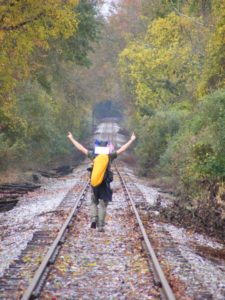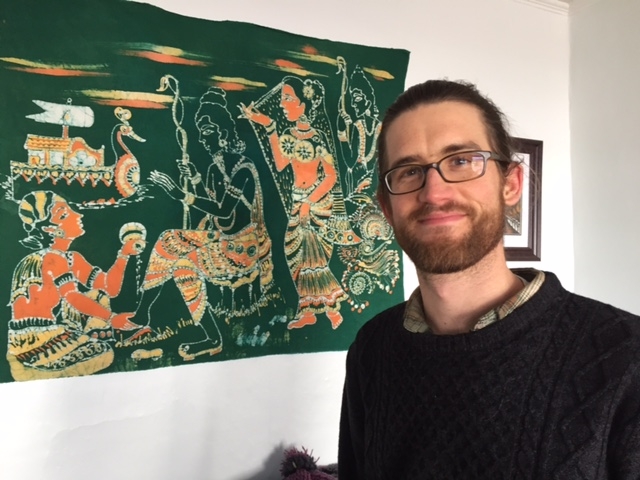Five years ago, at 23, Andrew Forsthoefel decided to walk 4,000 miles across America with a handmade sign that said “Walking to Listen.” Along the way, he recorded dozens of stories from the people he met.
Now settled in Western Massachusetts, Forsthoefel has a new book about his journey.
Andrew Forsthoefel lives above a beer supply shop on a busy commercial strip in Northampton, so we walked to a bike path, where we had a few quiet miles to chat.
This is familiar terrain for Forsthoefel — walking and talking. It’s how he spent 11 months wandering from Chadds Ford, Pennsylvania — where he waved goodbye to his worried mother and set off on the railroad tracks — all the way to Half Moon Bay, California.

“Before I walked across the country, walking was something I had done in sort of fits and starts, little hiking trips,” he said. “And then when I committed to a long-distance through-hike, walking became both my lover and my enemy. It became my teacher. It became a meditation, and it was miserable too! I don’t want to romanticize how miserable the experience was.”
When he started, Forsthoefel was a recent graduate of Middlebury College in Vermont, still grieving his parents’ divorce and looking for wisdom to guide him into adulthood.
He’d hoped to travel to a small village in Africa, but he lost a well-paying job and needed a cheaper adventure. That’s when he decided to fill a backpack with outdoor gear, a flip-phone, a mandolin and three books of poetry.
With $4,000 in savings, he planned to camp when necessary, accept a free couch when offered and record people’s stories.
“What sort of began to happen was that the walking primed me for connection with people,” he said. “All the hours I spent alone walking, sort of put me in this state of — well, basically — loneliness. I was just damn lonely out there, you know. To meet someone at the end of a day was just a miraculous thing to experience. Because there was no guarantee that I’d be with anyone that night. Maybe I was going to be under a bridge alone again.”
Forsthoefel followed a few self-imposed rules. He wouldn’t accept any ride that would shorten the trip. He would use only paper maps — no internet or GPS. And he wouldn’t listen to recorded music or podcasts.
“I wanted to be approachable. I wanted people to feel they wouldn’t be interrupting me, if they stopped and said something,” he said. “So I chose not to wear ear buds.”
That also helped him focus on self-reflection and random observations.
“I’d be walking along and I’d see a little strand of spider silk floating by, and just be mesmerized,” he said. “I would hear sounds I wouldn’t have heard otherwise. I’d feel things in my body I wouldn’t have felt otherwise. So it all became a pretty entertaining spectacle.”
He kept mostly to a southern route. Halfway through the trip, he bought a used babystroller to help haul his stuff, which must have been quite an image, he conceded, especially during the occasional bout of crying along the lonely highway.
He ate deep fried squirrel, got lost in the desert, and sang Amazing Grace with an old woman in Alabama.
He met many people outside the bubble of his middle-class youth: a trucker, prison guard, astrologer, Christian missionary, ceremonial dancer, retired bounty hunter, among others. He said they were often colorful, generous and contradictory.
“There was one woman and her husband who took me in to their home, took me out to dinner at Applebee’s or something. We had a great interview that night, cooked me breakfast in the morning,” he recalled. “And just as I’m heading out, she said, ‘You should think twice about walking through this town coming up ahead. All the whites left and the help stayed, and the Southern black is a whole different animal than the Northern black.'”
Forsthoefel said that kind of bigotry tended to shock him into silence, and he regrets not engaging people more in a discussion of their beliefs, and his. He said that’s one reason he wrote the book — to link the different perspectives he came across.
“I wished so many times that people I’d been with just the day before, who were warning me about people in the next town over, I wished they could be with me that night when I went to that town and got to meet some of these people and actually listen to them,” he said.
He emphasized that not only Southern conservatives could use a wider lens on the world, which is why he hopes his own example inspires future extreme-walkers.
“It would humble the most bleeding-heart liberal,” he said. “It would have the potential to complicate things for them in a way that’s very important, I think. Sort of erase the notion that anything is black and white. — including a Trump supporter. A Trump supporter is more than a Trump supporter. What else are they?”
Today, at 28, Forsthoefel is a full-time writer and public speaker. After a spiritual awakening on his big hike, he studies Buddhism and meditates.
If he were to take another cross-country listening walk, he said, he’d do it with other people.
Andrew Forsthoefel dedicated his book, “Walking To Listen,” to his mother.
Note: Thanks to Transom.org for interview clips from Forsthoefel’s journey, used in the broadcast version of this story. You can listen to Forsthoefel’s 2013 audio documentary about his trip.
